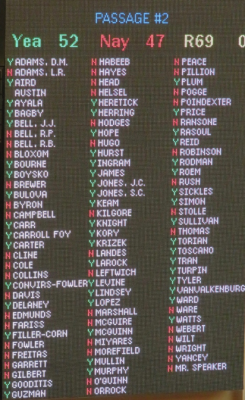Ben Tribbett: Democratic Wins in the House of Delegates – Inside Scoop
(Jan 15, 2018) Catherine Read talks with political analyst Benjamin Tribbett about the 2017 House of Delegates races here in Virginia. There were a number of contested races with close recounts in several districts, with the control of the House coming down to race in which a tie was declared and the winner’s name drawn from a bowl.There were a number of contested races with close recounts in several districts, with the control of the House coming down to race in which a tie was declared and the winner’s name drawn from a bowl. The 15 additional Democratic Delegates in the House means the Republicans control the vote in both chambers by a majority of one.
The 15 new Democratic Delegates (11 of them women) came from districts across the Commonwealth of Virginia. The Virginia House is seating the most women ever this year: 28, compared to 17 last year. Roughly half of the Democratic caucus is female.
In Southwest Virginia, newcomer Chris Hurst (HD 12) prevailed over three term incumbent Joseph Yost. [Voters in this region turned out more voters for Gillespie in ’17 than Cuccinelli in ’13]
In Hampton Roads, Kelly Fowler (HD 21) and Cheryl Turpin (HD 85) also won against incumbents. Shelly Simonds (HD 95) ended up in a tie with incumbent David Yancey, whose name was drawn from a bowl to retain his seat.
In Richmond, Dawn Adams (HD 68), Schuyler VanValkenburg (HD 72) and Debra Rodman (HD 73) prevailed in their races.

Danica Roem (HD 13) unseated longtime incumbent Bob Marshall in one of the most watched races in the nation. Danica is the first transgender woman elected to a state legislature prevailing over a notoriously homophobic candidate in what can only be described as a beautiful example of karma.
Lee Carter (HD 50) unseated incumbent Jackson Miller.
Hala Ayala (HD 51) won against incumbent Rich Anderson.
Elizabeth Guzman (HD 31) prevailed against 8 term incumbent Scott Lingamfelter. Guzmán and Ayala made history in Virginia as the first Hispanic women elected to the state’s House of Delegates.
Jennifer Carroll Foy (HD 2) a VMI graduate and new mom of twins won an open seat vacated by Delegate Mark Dudenhefer.
In Fairfax County, Kathy Tran (HD 42), Virginia’s first Vietnamese-American Delegate who welcomed her fourth child Elise just before the primary, won an open seat formerly held by Dave Albo. Karrie Delaney (HD 67) unseated incumbent four term incumbent Jim LeMunyon.
In Loudoun County, David Reid (HD 32) took the seat held by Tag Greason and Wendy Gooditis (HD 10) unseated incumbent Randy Minchew.

Ben also explores how power sharing might have been negotiated differently prior to knowing the outcome of the Simonds-Yancey name drawing. There was a long term power sharing arrangement in the Senate from 1997 to 2003. The window of opportunity has now closed to make that type of negotiation. He goes on talk about the creation of “Districts of Influence” and the percentages of deviations when re-drawing district lines after each U.S. Census. The GOP tends to split more voting blocks and the result in Virginia is 224 split precincts, with some of them split three ways. There is a possibility that pending court cases could find that district lines in Virginia need to be redrawn prior to 2021 which could result in special elections in the affected districts.
The 2019 elections will be a challenge for the Democrats in holding on to some of these newly won seats. Ben talks about how this is an off-off-off year election with no “top of ticket” candidate like Governor or President. Every seat in the House (100) and in the Senate (40) will be in play. In addition, County Board of Supervisor seats and School Board seats will also be on the ballot. Because of how these districts are overlaid, the ballot might have an incumbent Republican Senator, a first term Democratic Delegate and a Board of Supervisor candidate of either party. How the voters will make their voting decisions giving weight to incumbency and party remains to be seen. There is a strong possibility that some of the gains in the House may not be sustainable in 2019, while it is also possible Democrats will pick up the two Senate seats they need to take majority in the Senate.
Benjamin Tribbett is a longtime well known political analyst and political consultant and you can follow him on Twitter @NotLarrySabato